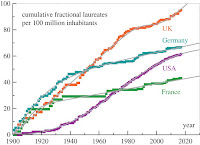 |
Topics: Civics, Commentary, Existentialism, Research
It has finally happened. The inevitable was likely to come. As we've celebrated stupidity as a virtue (hell, we somehow let a foreign power put an imbecile with the attention span of a gnat, and has taken pathological lying to Olympic levels in charge of the nuclear codes), it was most assuredly going to be reflected in the data:
The US’s dominance in scooping Nobel prizes for work in the natural sciences could be nearing an end, according to a new analysis of previous winners. Carried out by physicist Claudius Gros from the Goethe University in Frankfurt, Germany, it also finds that the UK has won the most Nobel prizes per capita, with Germany coming second and the US a close third (R. Soc. Open Sci. 5 180167).
Since they were first awarded in 1901, scientists who are nationals of the US, the UK, Germany and France have won the most Nobel prizes in physics, chemistry, and physiology or medicine. Around 120 laureates have been American, 40 British, 40 German and 20 French. To determine Nobel-prize productivity, however, Gros factored out population size, particularly given that the US population has more than quadrupled from 76 million in 1901 to 327 million today.
Of course, the laborers will deny it, pious and humble in their efforts to denigrate science, scandalize research, question reality, facts, data: try to morally equivocate between evolution and (not) "intelligent design." We have been on this anti-intellectual Primrose Path since the Scopes Monkey trials. A select segment of the species here in America made denial of facts a staple of membership to the cult, and find they have a political voice in a bipolar tweeting, carnival-barking avatar. As Dr. Gros continues:
Gros found that the US’s productivity peaked in 1972 at 0.83 Nobel prizes per year and per 100 million inhabitants. He says that the most striking element of the US data is the continued downward trend. Since 1972 its success rate has fallen by 60% to 0.34 Nobel prizes per year and per 100 million inhabitants, and it is still dropping. “On a per capita basis, the US’s era is definitively coming to an end,” Gros told Physics World. “Within 12 years the US science Nobel prizes productivity should fall by another 50%.”
That will put us down to 0.17 per 100 million inhabitants by 2030, when the population should be: 327,000,000*e^(0.02*18) = 468,698,719 (from the Growth Formula: N = N_0*e^rt, r = growth/death rate of 0.02, t = time).
That's going to be a lot of mouths to feed and employ with fewer and fewer minds to generate new ideas, industries and thus, employment of the masses. Our slide from "exceptionalism" will inevitably follow.
Is the end in sight for US Nobel prize dominance? Culture, History and Society
Michael Allen, Physics World, Bristol, UK


Comments